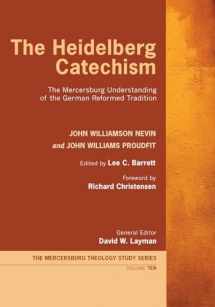
The Heidelberg Catechism (Mercersburg Theology Study)
Book details
Summary
Description
This volume is a collection of essays on the Heidelberg Catechism by John Nevin, a principal representative of the Mercersburg Theology that was birthed in nineteenth-century Pennsylvania. It also contains a critical response by John Proudfit, a more traditionally scholastic Calvinist. In these essays Nevin argued that the Heidelberg Catechism is an essential irenic confessional document that encapsulates the Reformed tradition and also builds bridges to Lutheranism and Roman Catholicism. According to Nevin the use of the Catechism is vital for shaping the identity of Christians and overcoming the dangers of individualism and subjectivism. Nevin's enthusiasm for the Catechism was a function of his understanding of the Christian life as progressive growth in Christlikeness, the church as the nurturing body of Christ, and the sacraments as conduits of Christ's vivifying personhood. These convictions stood in sharp contrast to the non-catechetical sensibilities of most nineteenth-century American Protestants who emphasized the sufficiency of Scripture alone, the church as a gathered community of like-minded individuals, dramatic conversion experiences, and the direct presence of Christ to the individual soul.


We would LOVE it if you could help us and other readers by reviewing the book
Book review



